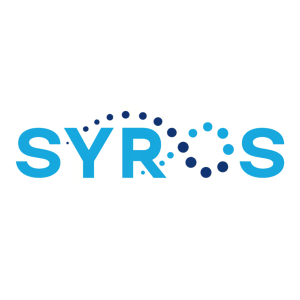Syros Receives Positive Opinion on Orphan Drug Designation from the European Medicines Agency for Tamibarotene for the Treatment of MDS
Syros Pharmaceuticals (NASDAQ:SYRS) announced that the European Medicines Agency (EMA) has issued a positive opinion for orphan drug designation for tamibarotene, aimed at treating myelodysplastic syndrome (MDS). This designation follows the FDA's granting of the same status in February 2022. Tamibarotene is currently being evaluated in the SELECT-MDS-1 Phase 3 trial alongside azacitidine for higher-risk MDS patients. Results from this trial are due in late 2023 or early 2024, with a potential new drug application filing anticipated next year.
- EMA granted orphan drug designation for tamibarotene for MDS treatment, enhancing market prospects.
- Tamibarotene is part of a pivotal Phase 3 trial, increasing the potential for future market approval.
- Positive opinion from EMA reflects advancement in critical treatment options for MDS patients.
- None.
Previously, the
“We are pleased that the EMA has issued a positive opinion for orphan drug designation for tamibarotene as it represents an important milestone for MDS patients, who have an urgent need for effective, tolerable, and convenient treatment options,” said
Orphan drug designation in the
The ongoing SELECT-MDS-1 Phase 3 clinical trial is evaluating the safety and efficacy of tamibarotene in combination with azacitidine for RARA-positive patients with newly diagnosed HR-MDS. Data from the pivotal trial are expected in the fourth quarter of 2023 or the first quarter of 2024, with a potential new drug application filing expected in 2024.
Syros is also evaluating tamibarotene in combination with azacitidine and venetoclax for RARA-positive patients with newly diagnosed unfit acute myeloid leukemia (AML), for which tamibarotene had previously received orphan drug designation from both the FDA and EMA. Data from the safety lead-in portion of the SELECT-AML-1 Phase 2 trial is expected in the second half of this year.
About
Syros is redefining the power of small molecules to control the expression of genes. Based on its unique ability to elucidate regulatory regions of the genome, Syros aims to develop medicines that provide a profound benefit for patients with diseases that have eluded other genomics-based approaches. Syros is advancing a robust clinical-stage pipeline, including: tamibarotene, a first-in-class oral selective RARα agonist in RARA-positive patients with higher-risk myelodysplastic syndrome and acute myeloid leukemia; SY-2101, a novel oral form of arsenic trioxide in patients with acute promyelocytic leukemia; and SY-5609, a highly selective and potent oral CDK7 inhibitor in patients with select solid tumors. Syros also has multiple preclinical and discovery programs in oncology and monogenic diseases. For more information, visit www.syros.com and follow us on Twitter (@SyrosPharma) and LinkedIn.
Cautionary Note Regarding Forward-Looking Statements
This press release contains forward-looking statements within the meaning of The Private Securities Litigation Reform Act of 1995, including without limitation statements regarding Syros’ clinical development plans with respect to tamibarotene, the potential of tamibarotene to benefit RARA-positive HR-MDS patients and to become the first approved therapy in a targeted population in HR-MDS, the timing of anticipated data readouts and potential regulatory submissions from Syros’ clinical trials, and the potential for Syros’s product candidates to obtain regulatory approval. In addition, a positive opinion from the EMA on Syros’ application for orphan drug designation for tamibarotene for the treatment of MDS is not a guarantee of approval of an orphan drug designation. The words ‘‘anticipate,’’ ‘‘believe,’’ ‘‘continue,’’ ‘‘could,’’ ‘‘estimate,’’ ‘‘expect,’’ “hope,” ‘‘intend,’’ ‘‘may,’’ ‘‘plan,’’ ‘‘potential,’’ ‘‘predict,’’ ‘‘project,’’ ‘‘target,’’ ‘‘should,’’ ‘‘would,’’ and similar expressions are intended to identify forward-looking statements, although not all forward-looking statements contain these identifying words. Actual results or events could differ materially from the plans, intentions and expectations disclosed in these forward-looking statements as a result of various important factors, including Syros’ ability to: advance the development of its programs, including tamibarotene, under the timelines it projects in current and future clinical trials; demonstrate in any current and future clinical trials the requisite safety, efficacy and combinability of its drug candidates; sustain the response rates and durability of response seen to date with its drug candidates; successfully develop a companion diagnostic test to identify patients with the RARA biomarker; obtain and maintain patent protection for its drug candidates and the freedom to operate under third party intellectual property; obtain and maintain necessary regulatory approvals; identify, enter into and maintain collaboration agreements with third parties; manage competition; manage expenses; raise the substantial additional capital needed to achieve its business objectives; attract and retain qualified personnel; and successfully execute on its business strategies; risks described under the caption “Risk Factors” in Syros’ Annual Report on Form 10-K for the year ended
View source version on businesswire.com: https://www.businesswire.com/news/home/20220803005673/en/
Media Contact
917-698-9253
csolberg@syros.com
Investor Contact
Stern Investor Relations, Inc.
212-362-1200
hannah.deresiewicz@sternir.com
Source:
FAQ
What is Syros Pharmaceuticals' recent EMA announcement regarding tamibarotene?
When is the expected data release for the SELECT-MDS-1 trial?
What is the significance of the orphan drug designation for tamibarotene?







